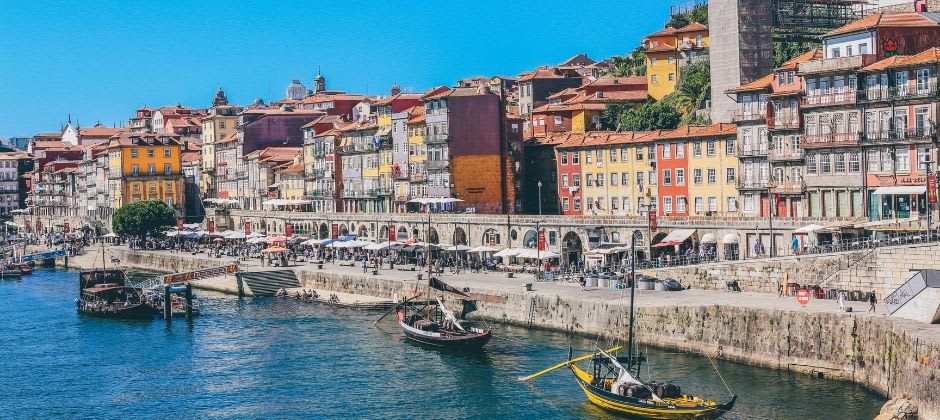Nassak Consultants | MBBS in Tajikistan
From the breath-taking mountains in the North, the picturesque beaches of the Algarve in the South and the bustling culture and nightlife of its major cities like Lisbon and Porto, the small Mediterranean nation of Portugal is a diverse and exciting place to choose to study abroad. Portugal boasts more than 125 private and public higher education institutions.

From the breath-taking mountains in the North, the picturesque beaches of the Algarve in the South and the bustling culture and nightlife of its major cities like Lisbon and Porto, the small Mediterranean nation of Portugal is a diverse and exciting place to choose to study abroad. Portugal boasts more than 125 private and public higher education institutions. With a globally recognized education system, international students heading to Portugal can look forward to a study abroad experience of a lifetime!
Over 50,000 international students choose Portugal as their study abroad destination every year, and for good reason. Portugal has a lower cost of living and lower tuition fees in comparison to many other European nations. Budget wary international students can rest assured that Portugal offers top quality education with the exciting vibrancy of the Mediterranean lifestyle, without breaking your piggy bank.
Like many other countries in the geographically compact European continent, Portuguese culture is highly influenced by its surroundings. A largely coastal country, fish and seafood make up a large part of traditional Portuguese cuisine. Once you eat a traditional Portuguese meal, you’ll begin to understand the importance of mealtimes as you settle in to the Mediterranean culture and lifestyle.
Visit a café in Portugal to sip on coffee and eat a pasteis de nata to get the true local experience. Cafés are used as a meeting place to socialize and communally watch important televised events, like political broadcasting or the futbol (soccer) games! Three of Portugal’s major cities, Lisbon, Porto and Guimarães have been designated as European Capitals of Culture, and cities and towns across the country all boast a wide variety of art, music, theatre and dance performances throughout the year.
Portugal may be small compared to neighboring Spain, but that comes with its advantages! If you have a day off from studying you can easily make day trips to other cities and towns in Portugal, and the beach is never too far away. As an international student, it’s good to know that Portugal has consistently ranked high when it comes to having an adventure and making new friends.
Portuguese people are well-known for their hospitability, and while locals will be sure to make an effort to speak to you in English, making the effort to learn some Portuguese is a great way to make the most of your time studying abroad in Portugal. Learning Portuguese will make day-to-day life significantly easier and increase your chances of finding either a part-time job in Portugal during your studies or pursuing your career goals in Portugal after graduation.
A member of the romance language family, using these four tips for picking up a new language, or even knowledge of some basic Spanish, French, Italian or Romanian, you’ll have a significant leg up when learning Portuguese. Once you’ve gained some knowledge of Portuguese, having it in your back pocket will be hugely beneficial if you decide to add any other romance languages to your language roster. No matter your reasons for choosing Portugal as your new home, when you make the move to study abroad in Portugal, you’ll surely be welcome with open arms.
Does Portugal sound like the study destination that you’ve been dreaming of? There are a huge number of things to consider when it comes to studying abroad, and research is the first step. Read on to discover everything you need to know in order to join 50,000 other international students in Portugal for an experience you’ll never forget!
Portugal – Quick facts & figures
| Capital | Lisbon |
| Language | Portuguese |
| Population | 10.3 million |
| Area Size | 92,212 km² |
| International students | 50,000 |
| Academic Year | September – July |
| Currency | Euro (€) |
| Calling Code | +351 |
| Time zone | WET (UTC) |

More about Portugal
Portugal has had a profound cultural influence across the globe, including a present-day legacy of 260 million Portuguese speakers, political significance as a member of the United Nations and the European Union, and historical importance as one of the founding members of NATO and the Eurozone. Traditionally a land of knowledge and innovation, Portugal is also a nerve-center of educational institutions. The higher education system underwent profound reform when Portugal became a signatory to the Bologna process, aiming to modernize higher learning across the European Union. An education in Portugal offers a wide selection of state-of-the-art public and private institutions, in a multitude of disciplines and courses that welcome international students.
Portugal’s rich and complex history has contributed to the uniqueness of Portuguese society as it stands today. In just the last century, Portugal has deposed their monarchy, had their government superseded by an authoritarian regime and subsequently restored democracy. Each chapter of Portugal’s eclectic and expansive history has left its distinctive mark on the nation. History is a tangible thing in Portugal, where you can contemplate stone carvings made 20,000 years ago in the Vila Nova de Foz Côa, gaze upon mysterious megaliths outside Evora and hike amid the granite peaks of the Serra da Estrela.
In the 21st century, Portugal is a developed nation with an advanced economy, high living standards and progressive politics. The nation continually champions the legislative protection of LGBTQ rights and in 2001 became the first nation to decriminalize the personal possession of drugs which saw significant improvements in the public health issues Portugal was facing pre-2001. The higher education system was ranked 35th in the world and the country’s universities feature five times in the 2018 QS World University Rankings, making an education in Portugal a popular and attractive choice for international students.
Education in Portugal
Alongside 47 other European nations, Portugal is a signatory to the Bologna Process, a Europe-wide strategy to harmonize the architecture of European higher education and promote educational mobility and modernization. The Bologna Process, first signed in 1999, aimed to widen access to higher education across Europe and allows for educational exchanges between countries.
Alongside 47 other European nations, Portugal is a signatory to the Bologna Process, a Europe-wide strategy to harmonize the architecture of European higher education and promote educational mobility and modernization. The Bologna Process, first signed in 1999, aimed to widen access to higher education across Europe and allows for educational exchanges between countries while guaranteeing universal standards across European higher education institutions.
Higher education in Portugal today, therefore, follows the traditional three-cycle format, split into undergraduate (Bachelor’s), graduate (Master’s) and postgraduate (Doctorate) certifications. Understanding the education system will help you feel well prepared to get in to an international university.
Polytechnics and Universities
Educational institutions in Portugal are divided into traditional universities and polytechnical schools that provide more practical and profession-oriented training. Both types of institutions have public and private counterparts spread across Portugal. There are currently 14 public universities and 36 private universities in Portugal, with 20 public polytechnics in Portugal and 64 private polytechnics.
Polytechnic universities provide vocational, career-based training in fields such as nursing, education, accounting and healthcare, while degrees in medicine, law, natural sciences, economics or psychology are offered by universities. There is also some crossover, with fields of study including engineering, technology, management, education, sports and humanities being taught in both university and polytechnic systems. Generally, if you’re looking to pursue a more general, overall education you should look towards studying at universities in Portugal, while students pursuing their studies in a more practical or hands-on field should apply for a polytechnic university.
Types of Degrees
Bachelor’s Degrees (LICENCIADO)
Both universities and polytechnics confer bachelor’s degrees in Portugal. In the polytechnic system, the completion of a bachelor’s certification requires 180 ECTS (European credits) and usually consists of six semesters, or three years of study. At Portuguese universities, depending on your program you may be required to obtain between 180 and 240 ECTS, usually six to eight semesters or three to four years of study.
Master’s Degrees
Portuguese universities and polytechnics both offer master’s degrees. A master’s degree from a polytechnical institution aims to provide students with a professional specialization, while master’s degrees from universities focus on innovation and have more of a research focus. In both types of institutions, students must obtain 90 to 120 ECTS over a duration of three to four semesters (one to two years), although for some more specialized programs such as medicine or law, obtaining a master’s designation can require a longer period of study. As well as obtaining the correct number of credits, all master’s students are required to publicly defend their dissertation, project work or traineeship reports in order to finalize their certification.
DOCTORATE
Doctorate/PhD programs in Portugal can be obtained at universities and university institutes. These are independent research degrees overseen by academics who are well-established in their fields. Like master’s students, doctoral students are required to publicly defend their thesis at the end of their degree. A doctorate degree can take up to three years of study and research.
Language Courses
The language of instruction at universities in Portugal is mostly Portuguese at the bachelor’s level. Some programs are offered in English at the bachelor’s level, and more at the master’s level If your first language is not English, you may have to prove your English capabilities through TOEFL or IELTS test results. Most universities will require a minimum level of proficiency in Portuguese or English at the B1 or B2 level. If you’re looking to brush up on your skills, taking a language class in Portuguese is a great way to make sure your language skills are up to par while you pursue your studies in Portugal.
Student Visas & Permits
The student visa requirements for studying Portugal depend on your nationality. The rules differ for EU/EEA nationals and non-EU/EEA nationals. Read on below to figure out what visa requirements you should consider before you travel to Portugal! Students from the EU and the EEA do not need a student visa to study in Portugal.
The student visa requirements for studying Portugal depend on your nationality. The rules differ for EU/EEA nationals and non-EU/EEA nationals. Read on below to figure out what visa requirements you should consider before you travel to Portugal!
EU/EEA Nationals
Students from the EU and the EEA do not need a student visa to study in Portugal but if your stay in Portugal will exceed 90 days, you must apply for a certificate of registration (Certificado de Registo) upon arrival at the local city council office. You should bring a national identity card or passport, as well as a valid European Health Insurance Card in order to be officially added to the population register. EU/EEA students should report their arrival and receive their registration within their first four months in Portugal. Students who are EU/EEA nationals can work in Portugal without any restrictions.
Non-EU Nationals
Non-EU/EEA students wanting to study in Portugal will require a student visa and a residence permit for the duration of their studies. International students should visit the Portuguese embassy or diplomatic mission in their home country to make their visa application. Non-EU students must obtain their visas before travelling to Portugal. Your visa application can take anywhere between one to three months to process, so make sure to apply early! Once non-EU students arrive in Portugal, they should book an appointment with the local branch of the Portuguese Immigration and Borders service (SEF) to apply for their residence permit.
There are two types of visas applicable to non-EU international students planning to study in Portugal:
- Type C: This short-stay visa is for non-EU students or researchers planning to undertake a course or research project in Portugal with a duration of less than 90 days.
- Type D: This visa is for all non-EU students or researchers undertaking studies in Portugal lasting longer than 90 days.
If you apply for any type of visa, like EU/EEA students, you will also be required to apply for a residence permit once you arrive in Portugal. Non-EU students can take up casual employment in Portugal (up to 20 hours a week) and work full-time during holidays or non-study periods.
How to Apply for a Student Visa to Study in Portugal
You can start the visa application process once you have received a letter of acceptance from a higher education institute in Portugal. The process is conducted at the Portuguese embassy or consulate in your home country – you may need to schedule a visa interview on their website, where you can also check the required documentation as it can differ depending what country you’re from.
The documentation that you need for your visa application might entail the following:
- Your completed application form (downloaded from the website of your local Portuguese embassy or consulate);
- A passport photo in color;
- A valid passport that expires no sooner that three months after your planned departure from Portugal with at least one blank visa page;
- A letter of acceptance from a Portuguese higher education institution;
- Proof that you have the financial resources to support yourself during your stay;
- Proof of valid health insurance;
- A copy of your travel itinerary to Portugal;
- Proof of accommodation, either on campus or privately; and
- You will also need to pay a visa application fee of up to 170 EUR.
Always confirm with your local consulate or embassy about the required documentation before submitting your visa application!
Residence Permits
Once you arrive in Portugal with your valid visa, non-EU/EEA students will need to apply for a residence permit which will be valid for one year. After a year, residence permits can be renewed for up to five years at your local SEF office.
The documentation required to apply for a residence permit is as follows:
- A completed application form;
- A valid passport and photocopy;
- Two recent passport sized photos in color;
- Proof that you have the financial means to support yourself in Portugal;
- Proof that you have adequate accommodation in Portugal;
- Proof that you have medical insurance;
- Proof of registration at a Portuguese higher education institution; and
- Proof that you’ve paid any applicable tuition fees.
Tuition Fees & Scholarships
Higher education institutions in Portugal independently choose how much they want to charge both national and international students, and there is no cap on tuition (propinas) for Portuguese universities and polytechnics. The Portuguese Ministry of Education establishes a minimum amount that is dictated by the national minimum wage (the minimum cost of tuition is 1.3 times the minimum wage).
Higher education institutions in Portugal independently choose how much they want to charge both national and international students, and there is no cap on tuition (propinas) for Portuguese universities and polytechnics. The Portuguese Ministry of Education establishes a minimum amount that is dictated by the national minimum wage (the minimum cost of tuition is 1.3 times the minimum wage). However, universities rarely charge students the minimum amount.
Cost of Studying at a Public University in Portugal
Average costs of studying at a public university in Portugal are:
- Bachelor’s and Masters – €1,250 per year
- PhDs – €2,500 – 3,000 per year
Students enrolled in a part-time program at a public university in Portugal should expect to pay about 70% of the fees a full-time student would pay. Exchange students may be exempt from paying tuition fees depending on the bilateral agreement between their home university and Portuguese university.
Cost of Studying at a Private University in Portugal
Average tuition fees for private universities in Portugal are slightly higher than public universities and average between €3500 to €3900 per year for all study levels.
Higher fees usually apply for non-EU/EEA program students; but some private Portuguese universities offer a discount of up to 100% of the lecture fees depending on a student’s final grades. It is also worth considering that most public higher education institutions in Portugal charge tuition annually, whereas most private institutions charge tuition month-to-month.
Scholarships for International Students in Portugal
There are a many public and private scholarships for international students in Portugal. Furthermore, some private scholarships are available to students planning to study specifically in Lisbon.
Public funding for EU and non-EU students alike is available through support from three key institutions:
- The Instituto Camoes, which offers scholarships for studies in Portuguese language and culture;
- The Directorate-General of Higher Education (DGES); which offers merit-based scholarships for all study programs and study-levels through individual institutions; and
- The Foundation for Science and Technology (FCT), which offers project-based research grants in the fields of science and technology.
Scholarships and grants are typically made available to master’s students, but some funding is also made available for bachelor’s students. Contact your institution to inquire about any further funding options that may be available to you!
